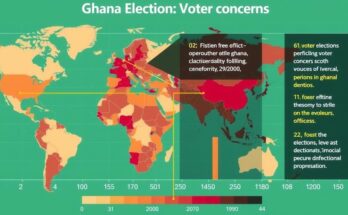In the battleground state of Pennsylvania, undecided Jewish voters are becoming increasingly pivotal as both the Democratic and Republican parties seek to secure their support. Concerns regarding antisemitism and the parties’ response to recent geopolitical tensions have led some Jewish voters, like Stephanie Spielman, to feel disillusioned with the Democratic Party, prompting increased Republican outreach efforts. The outcome of this engagement may significantly influence the upcoming election results.
In Pennsylvania, the sentiment among undecided Jewish voters is becoming increasingly significant in the context of the upcoming election. Many, like Stephanie Spielman, express feelings of unease and alienation from the Democratic Party, citing a perceived lack of genuine support for the Jewish community amidst escalating tensions related to Israel and rising antisemitism. As a lifelong Democrat who has distanced herself from the party this year, Spielman said, “I do not believe they are seriously supporting the Jewish community. They are not seriously engaging with us.” Israel’s conflict with Hamas has prompted Republican efforts to engage Jewish voters in key swing states, including Pennsylvania, which has approximately 300,000 Jewish voters. Given the narrow margins by which elections have been decided in the state, Republicans are keenly aware that every vote counts. The Republican Jewish Coalition has intensified its outreach, utilizing sophisticated data analysis to identify potential Jewish voters who may be receptive to their message. Matt Brooks, CEO of the Coalition, noted, “We know, almost to a voter, what the issues are that motivate them, and we can deliver a message.” These motivations range from concerns about antisemitism to economic issues, such as rising costs. In contrast, Democrats are actively working to reassure Jewish constituents and address their concerns. Organizations like the Zioness Action Fund are striving to articulate the Biden administration’s commitments to supporting Israel and combating antisemitism, emphasizing significant military aid to Israel during recent conflicts. Amanda Berman, a representative of the Zioness Action Fund, remarked, “There are a lot of concerns that could be better addressed, for sure.” The ongoing dialogue surrounding issues ranging from foreign policy to social values reflects a complex landscape of partisan allegiance among Jewish voters, who have traditionally leaned towards the Democratic Party. As this election approaches, it remains to be seen how these dynamics will play out, particularly with the potential for a significant shift in voting behavior based on pressing contemporary issues.
The Jewish electorate has been a crucial component of the Democratic Party’s base for many years; however, current geopolitical events, notably the conflict between Israel and Hamas, have catalyzed a shift in voter sentiment. These factors have heightened awareness and discussions surrounding antisemitism, prompting Republicans to target Jewish voters more aggressively. The situation in Pennsylvania is particularly notable due to its diverse Jewish community and its status as a battleground state in electoral politics, where every vote can significantly impact the overall outcome of the presidential race. Consequently, both parties are modifying their strategies to appeal to this demographic, with Republicans seeking to sway undecided voters and Democrats striving to maintain their support.
The current election cycle in Pennsylvania highlights a shifting landscape among Jewish voters, with many expressing concern over their treatment within the Democratic Party. As the Republican Party intensifies its outreach efforts, the undecided Jewish electorate finds itself at the crossroads of two competing narratives. Ultimately, how these voters respond to both parties will likely have considerable implications for the outcome of the election and may reshape the political allegiances of the Jewish community moving forward.
Original Source: www.cnn.com




